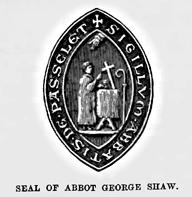Chapter XIV: Abbots Henry Crichton and George Schaw, 1459—1498
Abbot Shaw, like most of his predecessors, had to guard the possessions of his Monastery against encroachments of various kinds. A certain Hugh Fleming,[22] of Kynmunchayr, gave him trouble about certain lands called Dunnotyr, and pasture lying between Bachan in Kilpatrick, and his own property. The Dean of Lennox was instructed by apostolic authority[23] to assume with him chaplains and clerks, and going personally to the place[24] of the King at Dunbarton, once, twice and thrice, solemnly to warn Hugh, on the part of the Pope and the Bishops of the Scottish Church, that he was not, under pain of excommunication, to draw the Abbot and Convent before any lay tribunal, and to cite him to appear before apostolic delegates for the trial of his case. After this, we hear no more of Hugh Fleming, who likely thought he would gain little by an appearance against the clergy before an ecclesiastical tribunal.
There is also given in the Chartulary[25] a very graphic account of how the Abbot withstood any intrusion on his privileges by those of his own Order; and, in the minute and formal document of a notary public, we get a glimpse of the convent life. On the last day of January, 1489, at three o'clock in the afternoon, as it was getting dark, the Rural Dean of Rutherglen, going on his regular visitation, came riding to the gate of the Abbey with a retinue of servants, and sought admittance for himself and his followers. The door was, however, closed firmly against him, lest his unchallenged admission should be taken as a submission to his authority, or imply that he possessed any jurisdiction over the monks of the Order of Clugny. Meantime, notice of his arrival was sent to Abbot Shaw, who arranged how the Dean, who was kept waiting outside, was to be received. The Chamberlain of the Monastery, Sir John Mouss, came to the gate in all the pomp of office, accompanied by Robert Quhytford, the Cellarer, Alexander Clugston, a notary-public, and many other inmates of the house, clerical and lay, a Mr. Henry Newton, a Sir Cuthebert Mulykyn, and John Makquhen, a layman, being prominent. At the gate a little ceremony took place. The Chamberlain, meeting the Dean, informed him that by order of the Abbot he could not be admitted by right in his capacity of visitor, the Convent being exempt and privileged from the visitation of all ordinaries, as were also the places and churches belonging to them. The Dean then at once gave up any idea he may have had of an official visitation, and sought only the rights of hospitality. “Seeing he could not be received for the purpose of visitation, he was content to be received into the Monastery by the grace of the Abbot and Convent.” Before the company, however, left the gate, Alexander Clugston was called on to take note of what had happened, and he drew up afterwards, in the form of a public instrument, his account of the interview at the gate, writing with his own hand “those things which be had seen and heard.”
A visitor came to the Abbey in the summer of the same year who would not be kept so long in waiting as the intrusive Dean. This was the young King, who on the 11th May paid the Abbot a visit, the first of many with which he honoured the Abbey. He was again in the neighbourhood in July of the same year, engaged in quelling the insurrection of Lennox and Lord Lyle.[26] The castle of the one, at Crookston, and of the other, at Duchal, was soon taken by his energy ; and a reminiscence of their siege is found in the Chamberlain's Books, where we have the following item:—“The Laird of Hillhouse to ga to Paslay to get workmen, with spades and shools,[27] July 22, 1489.”

[22] Hugo Flandrenses.—Reg. de. Pas., p. 176.
[23] Vested in the Dean and Archdeacon of Dunblane.
[24] Placita.
[25] Reg. de Pas., p. 351.
[26] Tytler, Vol. II., p. 250.
[27] Shovels.